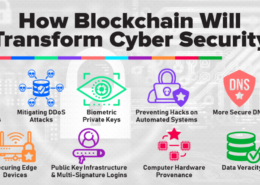Blockchain technology has significant potential beyond its use in cryptocurrencies. Here are some of the key areas where blockchain technology can have a broader impact: Supply Chain Management: Blockchain can enhance supply chain transparency, traceability, and efficiency by providing a secure, decRead more
Blockchain technology has significant potential beyond its use in cryptocurrencies. Here are some of the key areas where blockchain technology can have a broader impact:
- Supply Chain Management:
- Blockchain can enhance supply chain transparency, traceability, and efficiency by providing a secure, decentralized platform to track the movement of goods, materials, and information.
- This can help prevent fraud, improve inventory management, and ensure compliance with regulations.
- Identity and Credential Management:
- Blockchain can be used to create secure, decentralized digital identities that are more resistant to theft and fraud.
- This can be particularly beneficial for individuals who lack access to traditional identity documents, such as refugees or unbanked populations.
- Voting and Governance:
- Blockchain technology can be used to create secure, transparent, and tamper-resistant voting systems, potentially improving the integrity and accessibility of the electoral process.
- It can also support the development of decentralized governance models, where decisions are made through a distributed consensus mechanism.
- Healthcare and Medical Records:
- Blockchain can be used to store and manage medical records in a secure, decentralized manner, allowing patients to have greater control over their personal health data.
- This can improve data sharing, reduce administrative costs, and enhance patient privacy.
- Financial Services:
- Beyond cryptocurrencies, blockchain can be used to create new financial instruments, enable cross-border payments, and facilitate peer-to-peer lending and crowdfunding.
- This can increase financial inclusion and accessibility, particularly for underserved populations.
- Energy and Sustainability:
- Blockchain can support the development of decentralized energy grids, enabling peer-to-peer energy trading, smart contracts for renewable energy certificates, and the tracking of energy consumption data.
- This can facilitate the integration of renewable energy sources and promote sustainable energy practices.
- Real Estate and Asset Management:
- Blockchain can streamline real estate transactions, improve the management of property records, and enable the tokenization of assets, allowing for fractional ownership and easier trading.


Blockchain technology ensures the security and transparency of financial transactions through several key mechanisms: Decentralization: Blockchain operates on a decentralized network of nodes, each maintaining a copy of the entire blockchain. This structure reduces the risk of a single point of failRead more
Blockchain technology ensures the security and transparency of financial transactions through several key mechanisms:
Decentralization: Blockchain operates on a decentralized network of nodes, each maintaining a copy of the entire blockchain. This structure reduces the risk of a single point of failure or control, making it difficult for malicious actors to alter transaction data without consensus from the majority of nodes.
Cryptographic Security: Each transaction is secured using cryptographic techniques. Transactions are bundled into blocks, and each block contains a cryptographic hash of the previous block, forming a chain. This hash function ensures that any alteration in a block’s data will change its hash, making tampering evident.
Transparency and Immutability: Once a transaction is recorded in a block and added to the blockchain, it becomes immutable. This immutability, combined with the public nature of most blockchains, ensures that all transactions are transparent and can be independently verified by anyone, enhancing trust and accountability.
Smart Contracts: Blockchain platforms like Ethereum support smart contracts, which are self-executing contracts with the terms of the agreement directly written into code. These contracts automatically enforce and verify the conditions of a transaction, reducing the need for intermediaries and minimizing the risk of fraud.
Consensus Algorithms: Blockchain networks use consensus algorithms like Proof of Work (PoW) or Proof of Stake (PoS) to validate transactions. These algorithms require participants (miners or validators) to solve complex mathematical problems or stake their own cryptocurrency to add new blocks, ensuring that only legitimate transactions are recorded.
These features collectively ensure that blockchain technology provides a secure, transparent, and reliable framework for financial transactions.
See less